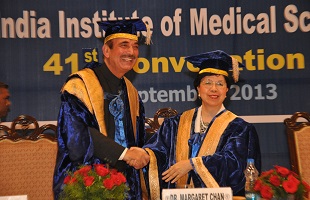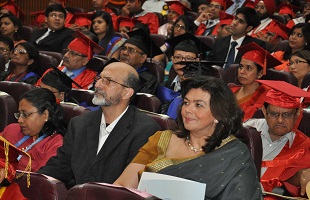“Health is a nation-building strategy,” said Dr Margaret Chan, Director-General of the World Health Organization, while delivering the convocation address at the 41st Annual Convocation of the All India Institute of Medical Sciences (AIIMS) in New Delhi on 12 September 2013.
Also present on the occasion were Mr Ghulam Nabi Azad, Minister of Health & Family Welfare, Government of India; Dr Nata Menabde, WHO Representative to India and Dr R.C. Deka, Director, AIIMS
Stressing on the need for life-long learning, Dr Chan said, “Many of you will begin to practice the art and science of medicine. You will experience some setbacks and surprises, and probably bouts of self-doubt. You will be wrong sometimes, but eventually right more often than not, as you will never stop learning.”

Firstly, that during the course of their careers, the number of India’s severely malnourished children, of girls and pregnant women with severe anaemia, will diminish to the vanishing point.
“Their management (of severely malnourished children) is a medical problem, a medical emergency, and it is a social problem, a social emergency,” she said.
Secondly, that patients with chronic diseases will benefit from screening and early detection services, and reach them at a stage when their care can help prevent acute events, help prevent long hospitals stays, huge medical bills, and an early death.
Thirdly, that the interventions they prescribe as best for their patients will never be a cause of their financial ruin.
“That no patient will be lost to follow-up because of an inability to pay. That the potential of your training to do great good will never be blocked by poverty,” said Dr Chan.
Dr Chan also spoke about the social determinants of health
“The Plan (twelfth five year plan) further acknowledges the need for public policies that address the broader social determinants of health. Treatment by the best doctors in the best hospitals will not tackle the root causes of ill health, with poverty being the deepest root of all,” she said.
Dr Chan gave an impassioned call for universal health coverage.
“Decades of experience also tell us that universal health coverage is one of the most powerful social equalizers among all policy options,” she said.
“Most countries that have achieved universal health coverage have needed three to four decades to do so. Members of the High Level Expert Group on Universal Health Care are confident that India can do this within 10 years,” she further added.
In her address, Dr Chan also explored the theme of how health relates to development.
“Growth in GDP is not the real measure of a nation’s progress. What matters most is the rate at which economic wealth is translated into less poverty, more opportunities, and better health,” she said.
Dr Chan also exhorted the students to never forget their humanity, or that of their patients.
“Remember: Of the seven deadly sins identified by Mahatma Gandhi, science without humanity is one,” she said.
The full text of the speech can be accessed at:
